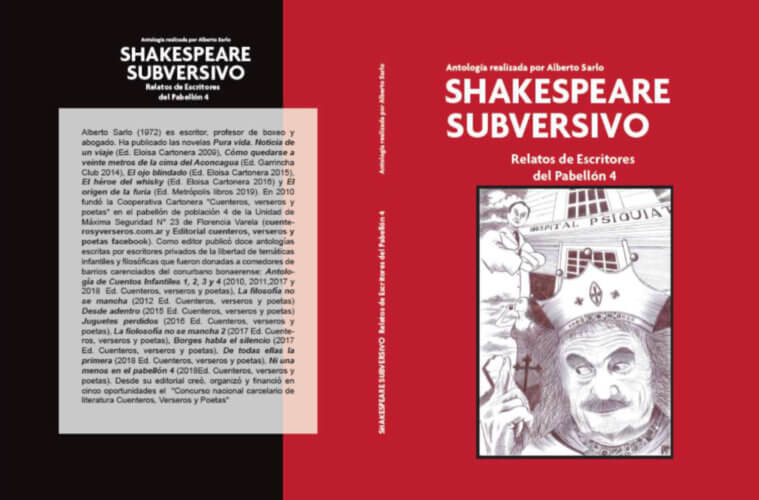We share the publication Subversive Shakespeare: Writers’ Stories from Pavilion 4, Anthology by Alberto Sarlo.
This is an anthology made by Alberto Sarlo with stories written by the inmates of the Florencio Varela prison, in the Province of Buenos Aires, Argentina, inspired by different works by William Shakespeare, which the inmates read during the workshop given by Dr. Sarlo at the population pavilion 4 of the Maximum Security Unit No. 23.
Subversive Shakespeare
We share the publication Subversive Shakespeare: Writers’ Stories from Pavilion 4, Anthology by Alberto Sarlo.
It is the anthology made by Alberto Sarlo with stories written by the inmates of the Florencio Varela prison, in the Province of Buenos Aires, inspired by different works by William Shakespeare, which the inmates read during the workshop given by Dr. Sarlo at population pavilion 4 of the Maximum Security Unit No. 23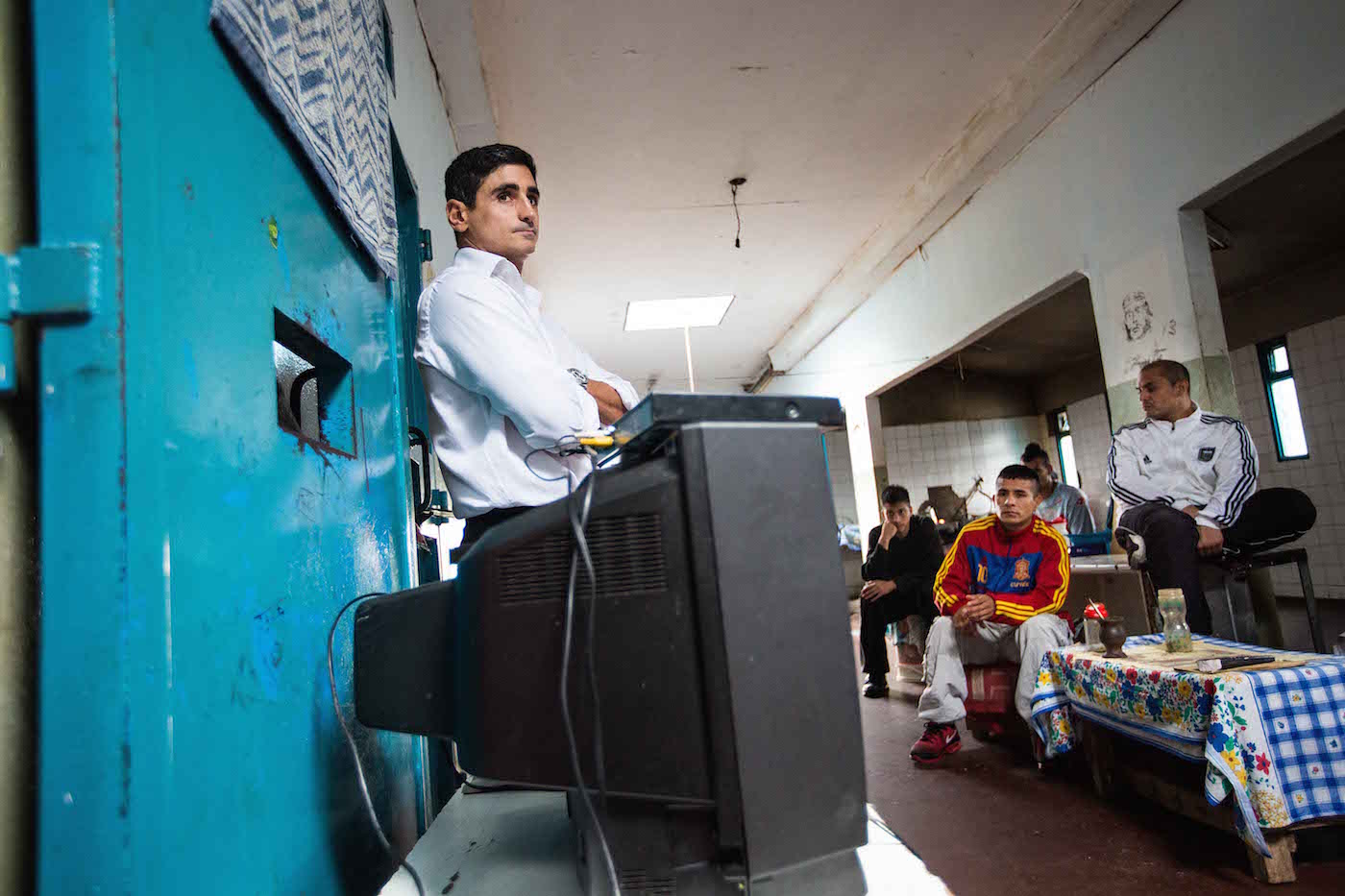
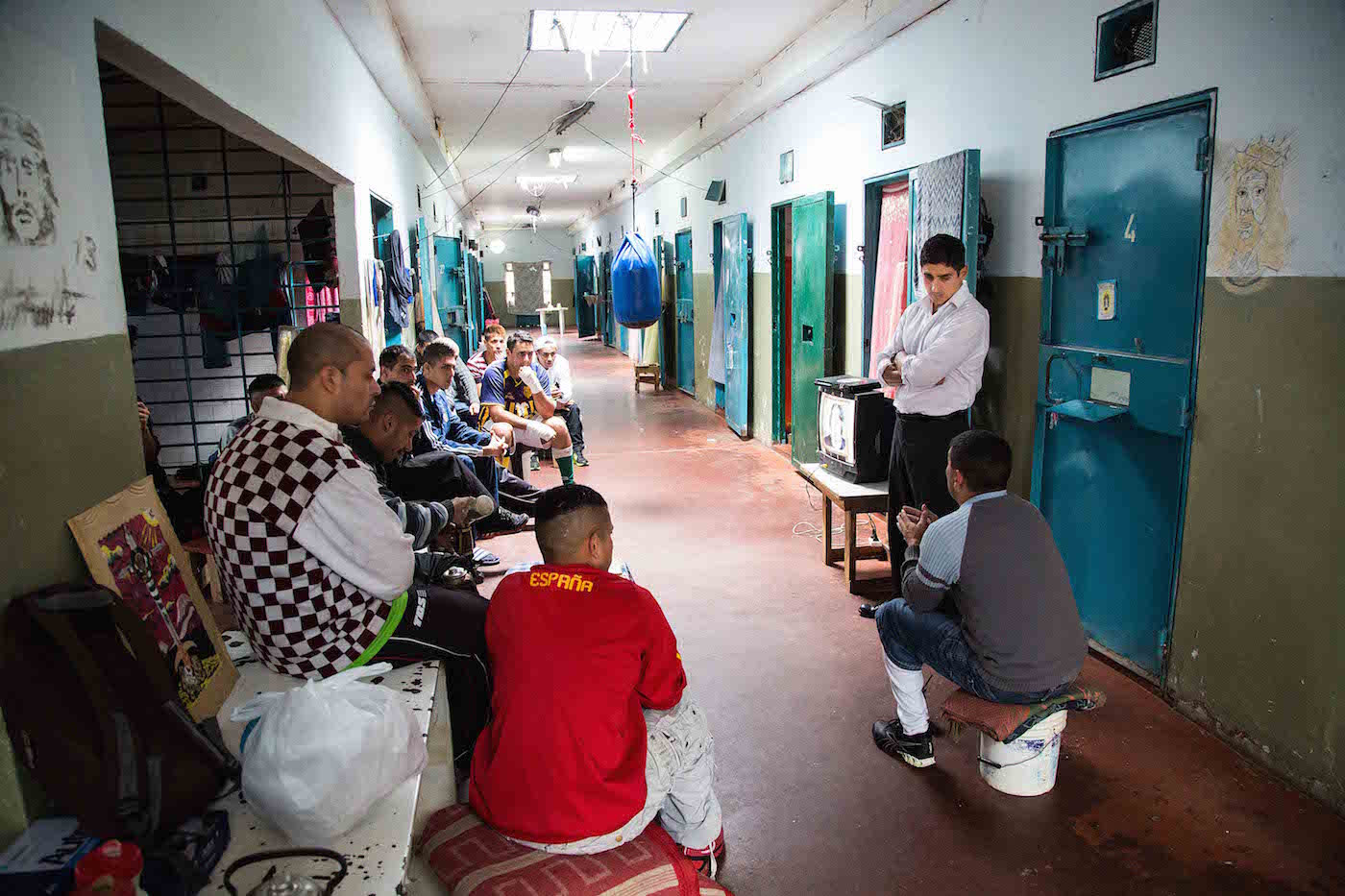
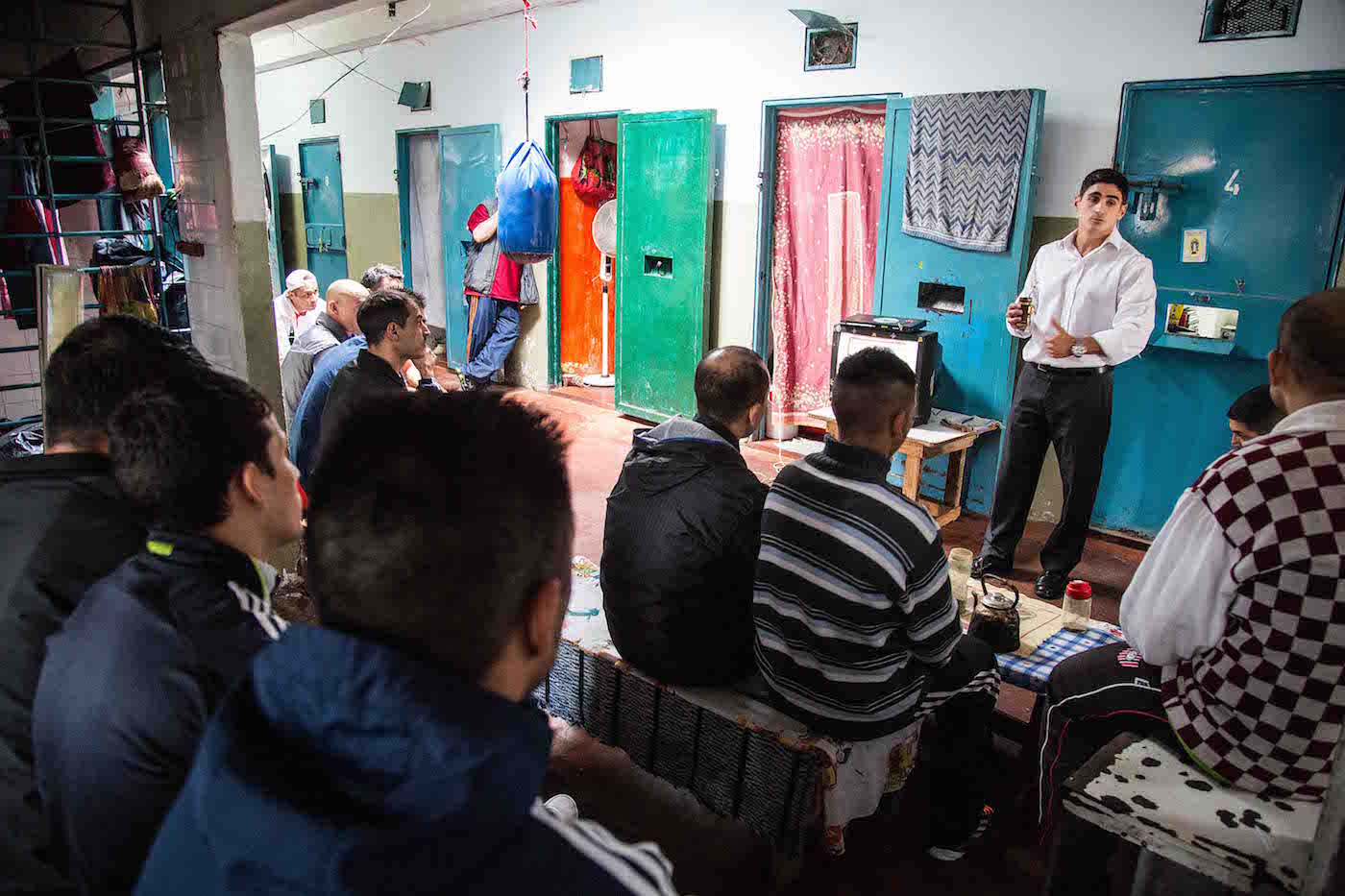 Photos of the Workshop given by Dr. Sarlo with the inmates of the pavilion 4 of the Maximum Security Unit No. 23 of the Penitentiary Service of the Province of Buenos Aires.
Photos of the Workshop given by Dr. Sarlo with the inmates of the pavilion 4 of the Maximum Security Unit No. 23 of the Penitentiary Service of the Province of Buenos Aires.
We share the Prologue of Alberto Sarlo
An emancipatory Shakespeare
‘Those who say that the lyrics are incomprehensible are those who, precisely, do not want anyone to understand them’, Indio Solari
In order for this book to reach your hands, the Pavilion 4 community carried out hard teamwork, in which the work of the artists and coordinators Francisco Bus Soto, Jorge Rivas, Nicolás Almeida and Marcos Utchurburu was fundamental. They were the proofreaders and advisers to the authors who are about to read. The graphic art of the cartoonists Pablo Montiel, Braian Brady, Santiago Fernández, César Bordón, Walter Normandín and Juan Manuel Pantano has also been transcendental in the making of the exquisite drawings that precede each story. The contribution of the student and teacher Gabriel Sánchez in the literacy workshop of the pavilion is also something that I want to capture in this prologue.
The storytellers, verse-makers and poets outside the walls are still Carlos Mena, Brian Calla and me. And the branches of the publishing house in Unit 9 of La Plata and Unit 42 of Florencio Varela continue to be in charge of former students, and today professors, Guillermo Quiroga and Fabián Miculán respectively, who not only continue to teach literature and philosophy while in prison, but they have already published countless stories on our website. I also want to share with you that our friends Roberto Alfredo Conti and Magalí Alescio continue to work on a similar project in Unit 40 in Lomas de Zamora, called A PIE. Follow them online because it is wonderful what they do together with Carlos Mena cultivating good literature in resilient pavilions.
Literature, as a social construct, is not outside the power disputes of language, because language is an exercise of power and at the same time, it is the battlefield of power itself. We can say the same of literature and, of course, of philosophy. Philosophy understood as questioning instituted certainties, philosophy as a device to challenge hegemonic responses. We storytellers, verse writers and poets are politically incorrect because we fight with common sense. We fight society, your society.
It is within this framework that we set out to experiment with Shakespearean works. The fifty-six companions read more than twenty plays that were reinvented, beaten up and adapted. We read, we discussed, we corrected and finally we selected. It is from this effort that you can access the best sixteen works creatively deconstructed by our writers. Thus was ‘Subversive Shakespeare’ born.
I will not stop to expose neither the descriptive virtues, nor the untimeliness of his story, nor the stark passions that William Shakespeare brilliantly unleashes in his prose. That’s what the sixteen artists you are about to read are for. What I will do is challenge the icon built around his name, because Shakespeare has ceased to be the enormous playwright we admire, to become a symbol. A symbol co-opted by literary elitism that places the English bard at the top of the western literary canon and, within that canon, is labeled as a reference to a complex and inaccessible dramaturgy. That label is false and the construction of that falsehood is one of the facets of the racism in which we live together.
Shakespeare (or whoever usurped that name to write the plays that we can enjoy today), created popular plays for an audience of illiterates, drunks, prostitutes, bandits, and gamblers. His works, loaded with a lot of black humor, eschatology, insults and double meanings, lasted an average of three hours, time in which the public fell asleep, drunk, fornicated, fought and defecated participating in the popular experience of the theater. Shakespeare was an emblem of the emancipatory struggle through art, he was a craftsman of language. Politically he was a ‘creator’ of the people. It is incomprehensible that four hundred years later the Literary Big Brother based in the European and North American universities, has arranged that only the castes of intellectual nobility can participate in the wonderful experience of reading him. William Shakespeare founded a fabulous and revolutionary poetics, a black dramaturgy, low class and Peronist (there you go).
That is why I chose the title ‘Subversive Shakespeare.’ Subversion is a word that comes from the Latin ‘subversio’. It is a word that refers to the action of disrupting, of revolutionizing, of shocking. But it also has a second meaning, much more interesting and less known. Sub – version, as hidden version. Silent version. Plugged or severed version. I chose the title ‘Subversive Shakespeare’, for both meanings: the combative of subverting the political, social and educational order; and emancipatory, by giving a voice to the voiceless. My brawler´s ethics is reflected in the first of the meanings, my political militancy the second.
I am a passionate reader of Shakespeare. Editing a book experimenting with its theater is an act of political action, it is to fight a battle. To fight a battle in the field in which I have been fighting for years: the battle for the vindication of thought. Common sense is an ignorant and powerful enemy that installs collective imaginaries. Common sense has many spokesmen, one of the best known is the school institution, an institution that expels, repels and ousts the ‘others’, POC & crooks….
School, in Greek ‘scholé’, means ‘leisure time’. The word school refers to a vacation space, an area that should represent a call to reflection, thought, personal fulfillment. That is my educational conception, that is my way of educating, that is my political struggle that led me to found Cuenteros, verseros y poetas, a school to which I dedicated more than four hours every Wednesday since May 5 of the year. 2010. It is a school with a social and political vocation, because my convictions lead me to militate the claim for the right to free education that every human being possesses.
My privileged situation forces me to think of myself as a passive or active bearer of a diffusing device of inequality and violence. If I want this fucking world to change something, I feel compelled to take action under that banner, that of emancipatory pedagogy. We are not going to achieve equity at coffee tables or roasts while drinking “fernet”. If we want fairness we have to go down to the mud and fight from the territory. Territory devastated by consumerism, territory usurped by individualism, territory stripped of privileges. There I have to be. The territory I chose is one of the many torture centers created by the West. It is the best place in the world to teach Shakespeare. I think so. That’s what I’m doing.
In Pavilion # 4 we have workshops on literacy, literature, philosophy, boxing, drawing, and music. In all these workshops creative spaces are generated with wonderful results. In none of our workshops do we take an exam. The exam is a medieval hindrance that survives by the overwhelming force of common sense conservatism. The school that I know, that I lived, is a school that reproduces the repressive and oppressive guidelines that regulate the society of privileges that condemn the black, the crook, the other, to the margins of that society
Being on the margins of society is to be absent from the distribution of rights, absent from the delivery of the citizen ID. The marginal is not a citizen, the marginal does not have rights and therefore surplus. The marginal must be annihilated and is being annihilated by trickle. In our prisons they are tortured every day, not as an exception, but as a disciplinary methodology. They torture not only with a prod, dry submarine, motor scooter, mailboxes and tourniquet, but they torture when they only eat one plate a day, when there is no drinking water, when they are transferred hundreds of kilometers away from their families, or when they abuse their relatives during visits. If the prey is a woman, the ignominy is worse, because woman is still in a lower stage than the prisoner. Didn’t you know all this? Approach a jail and meet the reality.
Common sense hides that reality, because if it came to light, the racist and perfidious nature of our society would be exposed. But common sense not only denies torture, it promotes it by encouraging overcrowding with ‘heavy-handed’ legislation. The certainty that we are racist and violent is easily demonstrable: According to the National Penitentiary Office and the Provincial Commission for Memory, the Buenos Aires Penitentiary System has a maximum capacity for 26,000 people, but as of today we have almost fifty thousand inmates.
Ninety percent of those prisoners were detained ‘in flagrante delicto’, immediate police arrest in the precise criminal act (a crime that in more than ninety percent of cases are against property, not against people). When the offender is detained, the arrest record is drawn up at the scene of the events and subsequently all the evidence made by the Buenos Aires police, the prosecutor and the judge is presented, who carry out a very summary trial. This clearly shows that we have the best police in the world or the worst judiciary on the planet. As if all this were not enough, close to sixty percent of the prisoners are innocent according to the National Constitution, since they are prosecuted, not convicted. For the black, for the poor, there is no National Constitution, there is only preventive detention, a prison that lasts for years and often ends with an acquittal. Another farce of common sense is the famous revolving door, a non-existent door since according to the World Prison Population List, the world average of imprisonment is 144 prisoners per 100,000 inhabitants, but in the Province of Buenos Aires the average rises to more than 245 prisoners for every 100,000 inhabitants. We are a jurisdiction with an average number of prisoners well above the world average, that is why the ignorant and reductionist discourse of the “revolving door” is another facet of the “post-truth” of our common sense.
And worst of all: in the Province of Buenos Aires more than three prisoners die a week. We are a society that practices the death penalty, badly despite our friends, judges, accomplices of this reality. We lost ten companions by action or omission of the state. In every book we publish we remember them and this time it will not be the exception. Our dead are Amalio Florencio Biasoli, Rubén Arroyo, Matías Castro, Santiago Funes, Jonatan Insaurralde, Miguel Nuñez, “Sapito” Romero, Gabriel “Toto” Rodriguez, Demián Galván and Javier Gentile. They are always with me and their memory always encourages my militant vocation. Militancy in defeat, but militant militancy. I am aware of defeat because victory was never a condition of my fight. Being pessimistic of reason to be optimistic of will is a vocational exercise. Gramsci galvanized the phrase but we can also find it in various referents of thought such as Spinoza who, abandoned and lonely, continued to affirm that he did it without fear or hope, an idea similar to the Lacanian ‘I wait, but I do not expect anything.’ I value and respect those who fight with hope for the future. I have no hope, I have conviction. I believe that hope paves the way for disappointment and skepticism. I’m probably wrong, but let me keep walking my path.
As long as death dictates the rules in our prisons, telling them that we continue to work without any state regulations that recognize us and facilitate entry to jail is futile, remembering that I continue to be resisted by the Ministry of Justice is futile, complaining about the mistreatment that I have suffered by the prison service is superfluous, denying that no official body prints the work of my students is naive. Nor do I think it contributes much that I got tired of seeing tubercular, mangy kids, deaf due to cockroaches entering the ear canal, amputated by gangrene and other herbs of our correctional policy. All that sounds empty because common sense says that the jets, that the blacks, that ‘the others’ must rot in jail. Common sense won out. I attest that prisoners rot in jail.
Common sense is not outside of you, common sense is built by your society and you are not outside. Your society is racist. My society is racist. If it were not like that, I would not have to tell you all this that I am telling you. If we didn’t live in a racist society, you would never be reading this book.
Think about it Think about you
Alberto Sarlo, May 2019
Dr. Alberto Sarlo tells in first person how the extraordinary editorial project was born and how he carried out: ‘Cuenteros, Verseros y Poetas’
“We were born at the end of April 2010 and we have already published more than seven thousand cardboard books that were donated to dining rooms in Quilmes, Florencio Varela and the Olmos Women’s Prison (towns in the Province of Buenos Aires in Argentina). The Editorial has a library of more than six hundred books, with more than four computers with their respective monitors and a state-of-the-art printer. The important thing is to highlight that both the library and the computers and printers ARE LOCATED WITHIN THE MAXIMUM SECURITY PAVILION (I insist that unlike all the other prison libraries in the country, ours is not in the area of education that is always within hundreds of meters, with several prison guards’ controls or is unreachable), a fact that is essential for the development of the project. I also clarify that my pavilion is a ‘POPULATION’ pavilion. ‘Population’ in prison jargon is the lowest class of pavilions, where they send the most dangerous and marginal (as opposed to primary or university or evangelical pavilions, etc.).
My philosophy, literature and boxing classes are not developed in the area of education, but I give them inside the pavilion, that is, inside the ‘houses’ of the inmates, thus achieving that my presence and the presence of books be constant and daily without the need to force to request permits and / or transactions with some guards in order to obtain the benefit of being allowed to leave the pavilion. I insist once again on this particularity of our project because it is essential to emphasize that it is essential that culture is within reach, that is, within the pavilion, a pavilion that being a ‘population’ is abandoned to self-government, being that when they enter officers or requisition enter accompanied by armed guard. My project tries to break this paradigm: the State must be inside the pavilions, it cannot leave them free to the self-government of the inmates.
In November 2017 the book BORGES HABLA EL SILENCIO was released, where after reading Borges’s complete works, the boys selected some stories, experimenting with them, changing characters and contexts to put together something new. In May 2018 we released NOT ONE LESS IN PAVILION 4, a book where we fictionalize stories to combat the prevailing machismo in the prison environment and in society as a whole. The Philosophy course is in full swing and in recent months we have studied Descartes, Kant, Hegel, Marx, Heidegger and we are currently with Horckheimer and Adorno (we want to get to Foucault this month).
With writers deprived of liberty we have also published last year the book ‘Philosophy does not stain 2’ which are stories of philosophical themes (you can also read Philosophy does not stain 1 that we released in 2012 and is in PDF next to rest on our blog ‘cuenterosyverseros.com.ar’ and / or on our Facebook page).
In 2014 we presented at the Book Fair in Capital Federal our latest book “Desde Adentro” (From Inside) where the authors (inmates of pavilion 4), narrate in first person the experiences of the inmates of the prisons in Argentina and in 2015 we published ‘Juguetes Perdidos” (Lost Toys), Which are testimonial stories of the boys narrating their sufferings in the Institutes for minors. I insist that you read it from our web page ‘cuenterosyverseros.com.ar’ where you will be able to know our Editorial and will be able to know all our work, as well as our best stories and poetry (there are hundreds of stories and poetry by different authors).
I state that my task is totally ‘ad honorem’ and that our Publishing house is not for profit and that we do not sell any of our books, but we give them away. We have also created four National Prison Contests, an unprecedented event in the country and in which prisoners and members of the Penitentiary Service of the entire Republic participated.
This year the fifth national prison contest is already organized where we give prizes of up to $ 26 thousand for the winners. All costs for prizes, computers, books, printers, boxing gloves and bags, etc., etc., are at my own expense. It is essential to note that neither the Penitentiary Service nor the Ministry have spent money (nor will they spend it) on my project.
The final idea is to integrate prisoners and prison staff under the aegis of culture. These contests are held every year and will serve so that the Penitentiary Units that have inmates and / or award-winning staff are forced to create at least one library like the one we launched in our Pavilion. In the long term we hope that the different prisons in the country have a library as large as that of our pavilion and why not, a lot of “Cartoneras” doing literature.
As part of the literature and philosophy classes, I also take the opportunity to teach them boxing since it is a sport that imposes a lot of discipline and training time, which keeps prisoners away from drugs and laziness that are the gateway to extreme violence.
As I said, all our work is given away. I do not accept donations or financial contributions since in that way I feel it freer for the kids to publish whatever they want.
Fundación Shakespeare Argentina congratulates Dr. Alberto Sarlo for the extraordinary work he does in helping prison inmates to express themselves and connect with literature, especially with the works of William Shakespeare.
We especially congratulate the inmates for their effort and dedication in writing (and illustrating) the stories inspired by different works by the English author contained in the volume “Subversive Shakespeare”.
With the permission and authorization of Dr. Alberto Sarlo we share the complete publication in PDF format:
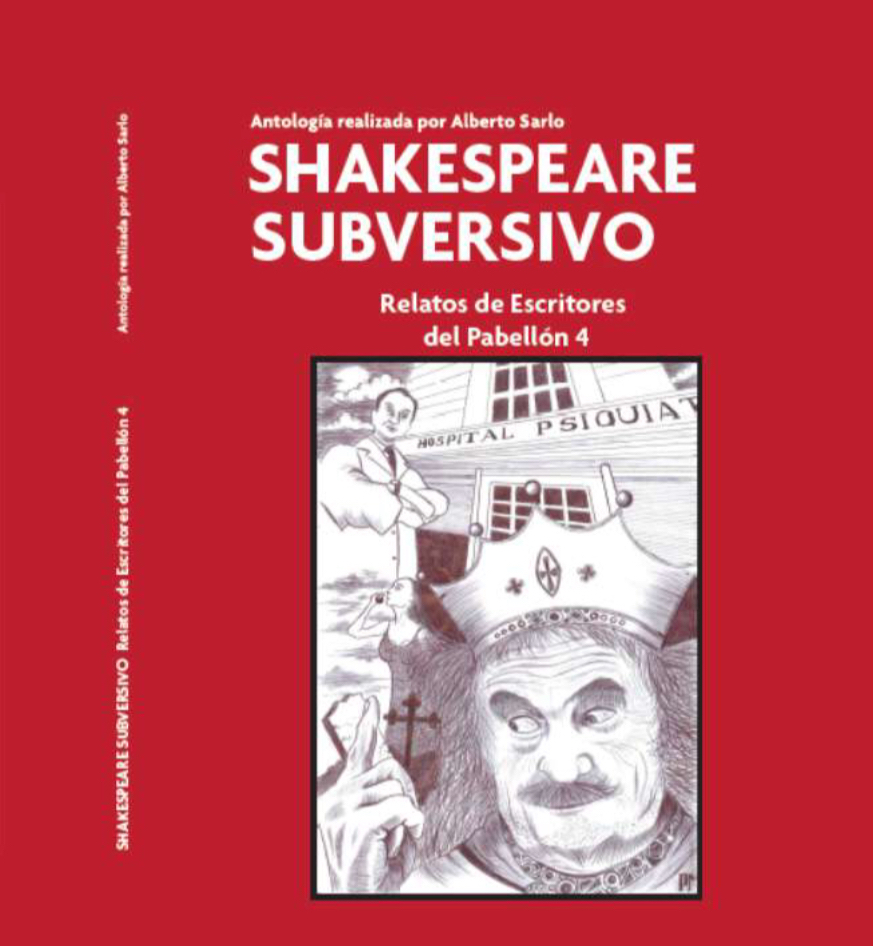
Read the tales written by the inmates based on Shakespeare´s works.



